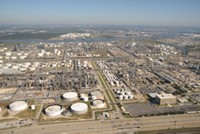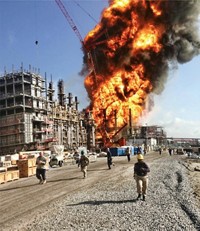Advertisement
Grab your lab coat. Let's get started
Welcome!
Welcome!
Create an account below to get 6 C&EN articles per month, receive newsletters and more - all free.
It seems this is your first time logging in online. Please enter the following information to continue.
As an ACS member you automatically get access to this site. All we need is few more details to create your reading experience.
Not you? Sign in with a different account.
Not you? Sign in with a different account.
ERROR 1
ERROR 1
ERROR 2
ERROR 2
ERROR 2
ERROR 2
ERROR 2
Password and Confirm password must match.
If you have an ACS member number, please enter it here so we can link this account to your membership. (optional)
ERROR 2
ACS values your privacy. By submitting your information, you are gaining access to C&EN and subscribing to our weekly newsletter. We use the information you provide to make your reading experience better, and we will never sell your data to third party members.
Safety
OSHA Levies Fine For Fatal Explosion
Safety: Agency cites 371 violations but stops short of prohibiting use of natural gas for pipe cleaning
by David J. Hanson
August 6, 2010
| A version of this story appeared in
Volume 88, Issue 33

The Occupational Safety & Health Administration issued a $16.6 million fine yesterday for a February explosion and fire at the Kleen Energy Systems power plant in Middletown, Conn. The accident killed six workers. OSHA levied the fine for 371 workplace safety violations by three construction companies and 14 contractors; it is the third largest ever sought by OHSA for a single incident.
"These employers blatantly disregarded well-known and accepted industry procedures and their own safety guidelines," said Assistant Secretary of Labor for OSHA David Michaels in a statement. "We see this time and time again across industries when companies deliberately ignore safety precautions in the interest of completing jobs quickly."
The accident was caused by contractors pumping high-pressured natural gas through new fuel lines at the facility to remove debris, a standard operating procedure. The large volumes of gas did not disperse as expected and exploded upon contact with an ignition source.
OSHA stated that it is sending warning letters to operators of natural gas power plants regarding this dangerous practice, emphasizing the need to ensure that all safety procedures are used. Michaels said, however, that the agency is not going to initiate regulatory action to ban the practice.
This decision runs counter to a strong recommendation from the Chemical Safety & Hazard Investigation Board, an independent federal office that seeks out the causes of chemical accidents. In its report on the Kleen Energy accident, CSB said that the practice of using natural gas blows is inherently unsafe and should be banned (C&EN, May 24, page 24).
CSB Chairman Rafael Moure-Eraso was disappointed that OSHA did not take stronger action. "Dr. Michaels stated that OSHA likely does not have the authority to prohibit the use of flammable gases during pipe cleaning operations," Moure-Eraso said in a statement. "But CSB believes that OSHA does have adequate authority to take this action and to start the standard setting process anytime."
Moure-Eraso noted that CSB found several safer alternatives for pipe cleaning, including using compressed air or nitrogen. Companies are already starting to ban the practice on their own, he said, pointing out that General Electric has informed its customers that it will not support using natural gas to clean out pipes leading to its turbines.
The charged companies have 15 days to pay or contest the fines. Two of the construction companies, O&G Industries, which was fined $8.3 million, and Keystone Construction & Maintenance, which was fined $6.7 million, already have indicated they will challenge the fines.




Join the conversation
Contact the reporter
Submit a Letter to the Editor for publication
Engage with us on Twitter